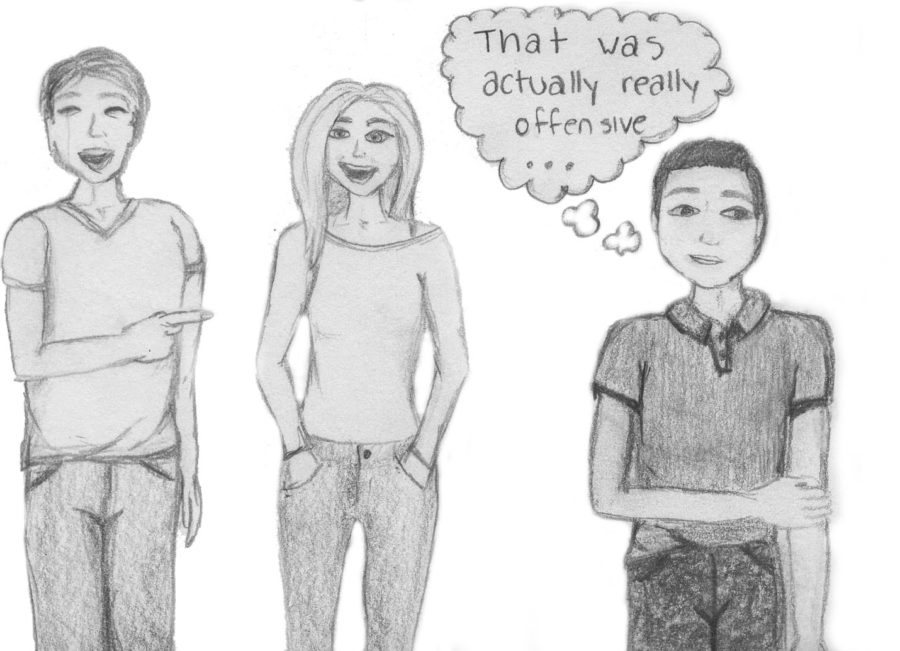#thisis2016 illuminates casual racist joke culture
November 4, 2016
“So how do you Asians put on your contacts?” a classmate asked.
“I just cut them in half before I put them in,” I responded.
This is just one example of many experiences I have gone through dealing with racism. As an Asian-American, I’ve dealt with countless number of insults or “jokes” for being Asian. I say “jokes” with quotations because that is always the reasoning for all the slander I receive.
These “jokes” have always been made by friends or just classmates. Most of the jokes are just plain stupid with no creativity.
I used to tell people that if they had the audacity to make an Asian joke, they should at least make it somewhat original. But I’ve realized that this has made it only worse.
I have always dealt with these encounters with my own sense of humor, embracing it instead of being defensive. People will joke saying, “Can you even see?” and I respond with my eyes closed jokingly saying, “Nope – not even a little.”
This was just always my way of dealing with this type of racism. It was easier for me to accept it than defend against it, but after watching the New York Times video called #thisis2016, it got me thinking and I realized that I needed to change.
The video is based off the New York Times article by Michael Luo called “An Open Letter to the Woman Who Told My Family to Go Back to China.” Luo responds to this encounter by writing an open letter to describe the experiences he’s gone through and explains how the woman was in the wrong.
After Luo had the encounter with the woman, he decided to tweet about it using #thisis2016. This inspired thousands of Asian-Americans to tweet out their own experiences of racism, and soon after, he created the video that went viral.
The video showed Asian-Americans reading their own tweets about their racist encounters. Middle-aged people describing their encounters put me in a depressed mood, but at the same time helped me realize that the racism I go through in high school will continue until the day I die.
These people were explaining confrontations that happened a week or a couple years ago. This is still an ongoing thing for them as adults, which honestly scared me.
I just started to get used to the “jokes” I’ve received from my friends, but I knew that in coming years I would receive this type of treatment even in the work environment or in the general public. I realized that if I continue to give in and take this type of racism with humor, people will only continue to make these put-downs.
This is not an article where I call out all my friends and people who have been racist towards me. But rather an apology. It’s an apology to my culture. Rather than defending my culture and fighting for my identity, I have chosen to embrace the insults and continue on with my life.
I have always been embarrassed to go out in public with my parents because of the language barrier. My mom speaks English fluently, but my dad is not as experienced. With something as little as ordering food at the drive thru or asking a worker a question, I was always ashamed to see my dad trying to communicate with others; it embarrassed me to see the trouble my dad had speaking and the people trying to understand.
But why did I think like this? Why was I ashamed for being who I am? Why did I hate my culture? These were the thoughts that went through my head while watching the #thisis2016 video.
Honestly, I have no one to blame but myself. Embracing the racism I received through my own humor made others feel as if it was okay.
I didn’t do anything to stop it, so why would they? Instead of saying, “Hey, quit it. That’s actually really offensive,” I said, “Do you have any other good Asian jokes?”
I love my friends, and they’re all like brothers to me. Obviously it hurts when one of them makes an Asian joke. But they don’t know any better.
I haven’t done anything to make them understand how I feel or explain how offensive it truly is. It’s my fault because I have made them act as they do, and now I know that in a couple of years if I continue to just let it happen, coworkers and bosses will do the same thing.
So I just want to say I’m sorry. I’m sorry to my dad for thinking so lowly of you. You are the best dad a son can ask for, and if I had the choice to make you speak better English, I wouldn’t because every aspect about you makes you who you are: the best dad.
I want to say sorry to my culture. I’m sorry for choosing to neglect you. People have always called me “the whitest Asian” or a “twinkie” for being yellow on the outside and white in the inside. But I don’t think it’s true at all. I’d rather be a banana or a lemon. I’m yellow all over and proud.
Lastly, I’m sorry for not telling you guys otherwise. When you said those Asian jokes I just laughed and made it seem like it was ok. But in truth, it’s not. It hurts me inside every time, and even though I hide it with a laugh, I want you to know that it really does offend me and I really hope that you’ll understand to stop. #thisis2016



